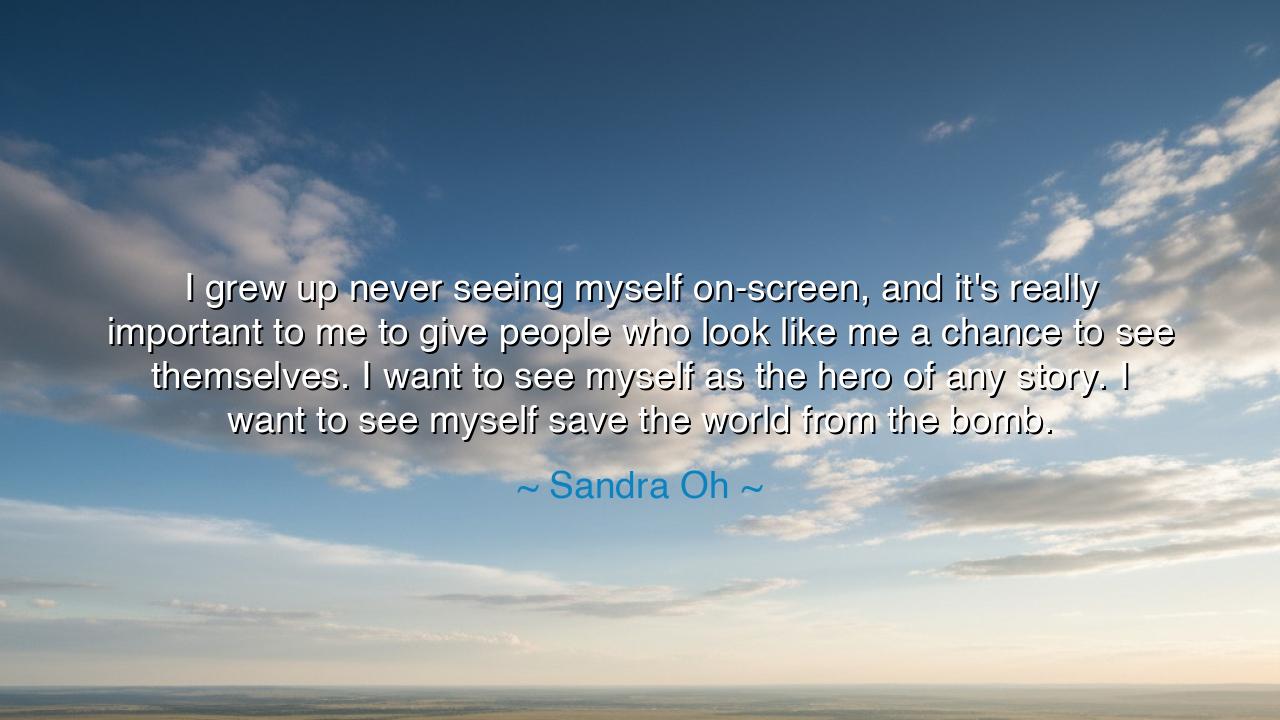
I grew up never seeing myself on-screen, and it's really
I grew up never seeing myself on-screen, and it's really important to me to give people who look like me a chance to see themselves. I want to see myself as the hero of any story. I want to see myself save the world from the bomb.






Host: The gentle hum of the evening settled in, the room quiet and peaceful. Jack sat at the table, his fingers resting lightly on his cup, absorbed in thought. Jeeny stood near the window, her gaze turned outward, reflecting deeply on Sandra Oh's words.
Jeeny: “I’ve been thinking about what Sandra Oh said: ‘I grew up never seeing myself on-screen, and it’s really important to me to give people who look like me a chance to see themselves. I want to see myself as the hero of any story. I want to see myself save the world from the bomb.’ It’s such a powerful statement, isn’t it? The idea that representation is not just important, but essential—because growing up without seeing yourself reflected in the stories you love can make you feel invisible.”
Jack: “Yes, exactly. Oh is expressing a deep truth about the impact of representation in media. If you don’t see people who look like you in positions of power or heroism, it sends a message that you’re not meant to take those roles. It’s not just about visibility; it’s about empowerment. When you see yourself as the hero, it shapes the way you see yourself and the possibilities available to you.”
Jeeny: “Exactly. What she’s saying is that representation is not just about filling a quota, it’s about allowing people to dream bigger, to imagine themselves in roles they might never have thought possible. For Oh, it’s not just about being seen—it’s about breaking barriers and giving others the opportunity to envision themselves in roles of power, strength, and importance.”
Host: The stillness in the room deepened, as they both considered how media—television, film, books—shapes perceptions, not just of the world, but of ourselves. Jack’s fingers rested on the table, while Jeeny’s gaze softened, reflecting on the long history of underrepresentation, especially for people of color, and the importance of seeing those stories shift.
Jack: “It makes me think about how powerful it is to see yourself represented in the world. It’s easy to overlook how much of our self-worth and self-image is influenced by what we see around us. Oh is showing us that when we don’t see ourselves reflected as the heroes—whether in films or in society—we lose out on seeing the full extent of our potential.”
Jeeny: “Exactly. For Oh, it’s about visibility in a way that goes beyond just being seen on-screen. It’s about seeing yourself represented as someone who can shape the world, who can be the hero. It’s about claiming your place in the story—not as a side character or an afterthought, but as a central figure, someone who makes a difference. Representation like that gives people the freedom to imagine themselves as anything, even as world-saving heroes.”
Jack: “It’s about changing narratives, too. For too long, the stories in media have centered around a narrow idea of what a hero looks like, who they are, and what they do. Sandra Oh is calling for a shift—she wants to see herself as the one saving the world, just like anyone else. It’s about breaking the mold of who gets to be the protagonist, who gets to shape the story, and who gets to be in control of their destiny.”
Jeeny: “Yes, and I think that’s why Oh’s words are so powerful. She’s speaking not just for herself, but for anyone who’s ever felt left out of the narratives that are often celebrated. She’s giving a voice to those who’ve been relegated to supporting roles, or not seen at all. Her desire to see herself as the hero is a call for everyone to see themselves in those roles, too. We all deserve to be seen as capable, important, and worthy of leading our own stories.”
Host: The quiet in the room grew deeper as their conversation unfolded. The realization that representation isn’t just about seeing characters on-screen, but about seeing oneself as capable of heroism, strength, and agency, had taken root. Sandra Oh’s words had sparked a reflection on the power of representation in shaping how we view ourselves and our place in the world.
Jack: “So, in a way, Oh is asking for a world where we don’t just passively consume stories—we create them. We stop waiting for others to give us roles and start claiming them for ourselves. It’s about stepping into the center of our own stories.”
Jeeny: “Exactly. Representation isn’t just about visibility; it’s about empowerment. When we see ourselves as the heroes, we start to believe we have the power to create the world we want to live in. And that shifts everything—not just for us, but for everyone who has ever been overlooked or underestimated.”
Host: The evening had fully settled in, their conversation leaving behind a quiet realization that representation is not just about being seen—it’s about being empowered to take up space, to lead, and to define our own stories. Sandra Oh’s words had reminded them both that we all deserve to see ourselves as the heroes of our lives, capable of making a difference and shaping the world. The world outside had darkened, but inside, there was light—a recognition that when we see ourselves as central to the story, we can change the narrative for good.






AAdministratorAdministrator
Welcome, honored guests. Please leave a comment, we will respond soon